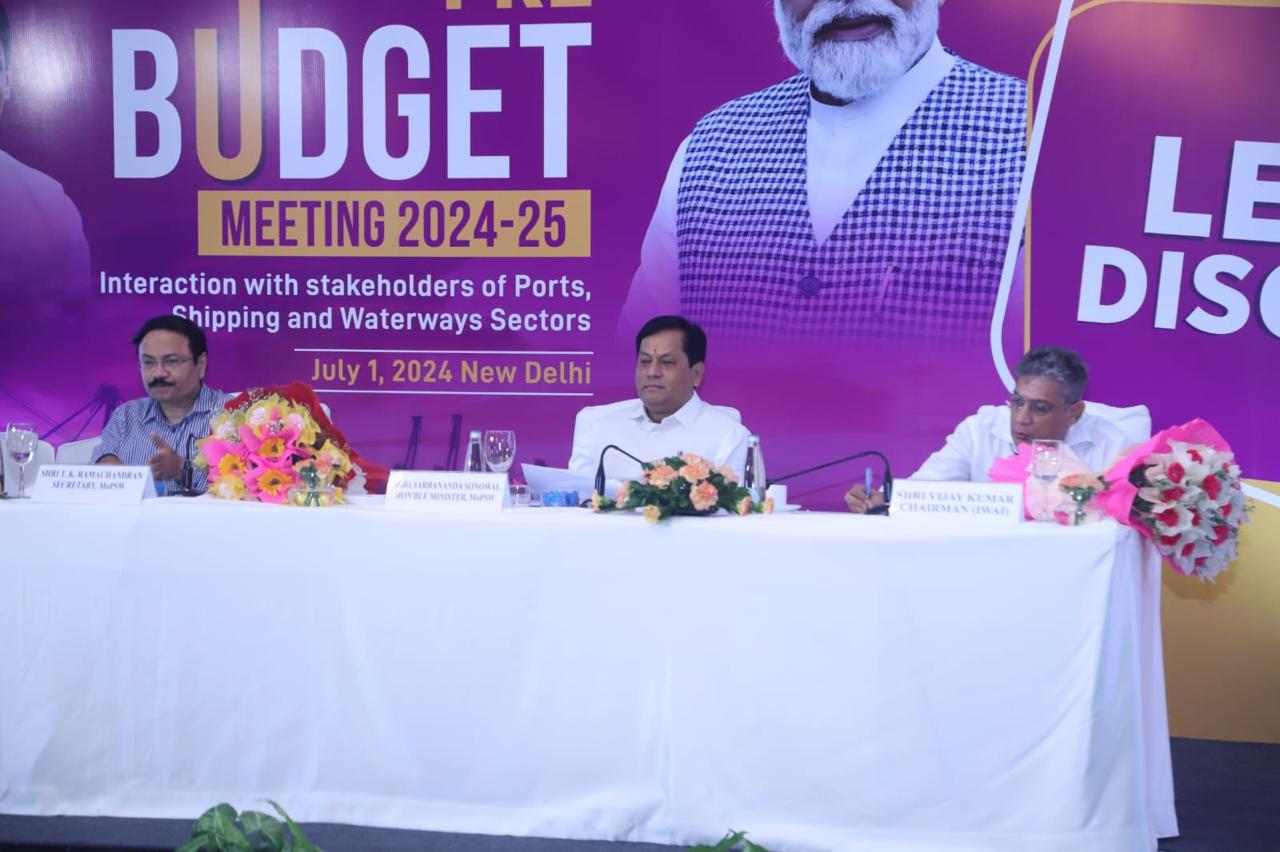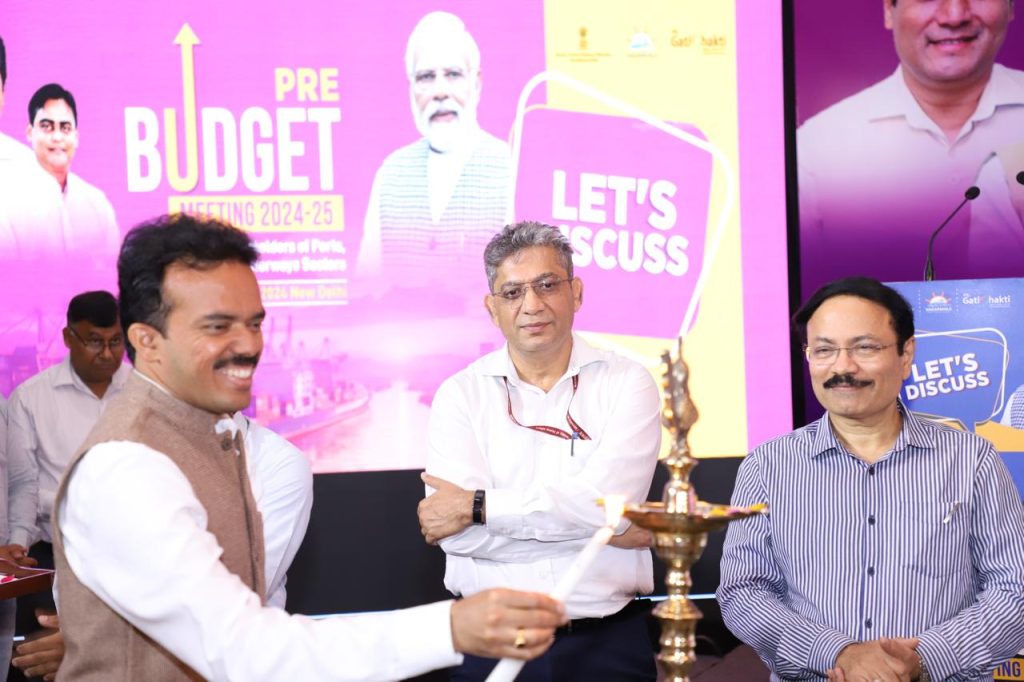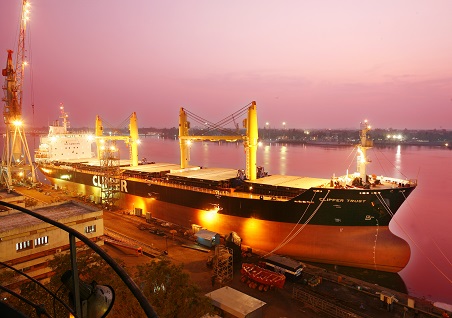Union Minister of Ports, Shipping, and Waterways, Sarbananda Sonowal, holds a pre-budget meeting with stakeholders to gather insights for an inclusive budget – Maritime News
Challenges Faced by Stakeholders, Proposed Resolutions and Expected Further Steps
-
Infrastructure Development:
- Challenge: Limited and outdated maritime infrastructure hampers efficient cargo handling and increases operational costs.
- Resolution: The Ministry of Ports, Shipping, and Waterways is spearheading projects like the Vadhavan Mega Transshipment Port and Sagarmala Programme to develop world-class infrastructure, enhance port capacities, and improve cargo handling efficiency. The Cruise India Mission aims to boost cruise traffic, further supporting infrastructure development in the tourism sector.
- Further Steps:
- Increase investment in smart port technologies to streamline operations.
- Develop integrated logistics hubs to support multimodal transportation.
- Enhance connectivity between ports and hinterlands through improved road and rail networks.
-
Environmental Sustainability:
- Challenge: The maritime sector’s environmental impact, including emissions and pollution, poses significant challenges.
- Resolution: Initiatives like the Harit Nauka promote green fuel transportation in inland waterways. Policy reforms supporting green initiatives and sustainable practices will reduce the environmental footprint of maritime activities.
- Further Steps:
- Implement stringent environmental regulations and monitoring systems.
- Promote research and development in green technologies.
- Encourage the use of renewable energy sources in port operations.
-
Financial Constraints:
- Challenge: Access to financing for ship acquisition and infrastructure development is limited, affecting the growth and competitiveness of Indian maritime companies.
- Resolution: Financial support mechanisms such as the Maritime Development Fund (MDF) and Ship Owning and Leasing Entity (SOLE) will provide necessary financing. The Shipbuilding Financial Assistance Policy aims to support shipyards, fostering industry growth and enhancing competitiveness.
- Further Steps:
- Establish partnerships with international financial institutions.
- Create financial incentives for private investments in maritime infrastructure.
- Develop insurance and risk mitigation solutions to attract investors.
-
Policy and Regulatory Issues:
- Challenge: Complex and outdated policies, including tax and GST regulations, create hurdles for stakeholders in the maritime sector.
- Resolution: Policy reforms in tax and GST aim to simplify regulations and provide incentives for the maritime sector. These reforms will support shipbuilding and other related industries, making them more competitive globally.
- Further Steps:
- Regularly update and streamline maritime policies to align with global standards.
- Simplify customs procedures to expedite cargo clearance.
- Foster a transparent regulatory environment to encourage foreign investments.
-
Employment and Skill Development:
- Challenge: The maritime sector faces a shortage of skilled workforce and employment opportunities.
- Resolution: Major projects like the Vadhavan and Galathea Bay Transshipment Ports are expected to generate significant employment opportunities. The Ministry is also focusing on skill development programs to ensure a steady supply of trained personnel for the industry.
- Further Steps:
- Launch vocational training programs in collaboration with educational institutions.
- Establish maritime training centers equipped with modern simulators.
- Promote career opportunities in the maritime sector to attract young talent.
-
International Competition:
- Challenge: Indian maritime companies face stiff competition from international players, affecting their market share and profitability.
- Resolution: Strategic initiatives aligned with Maritime India Vision (MIV) 2030 and Amrit Kaal Vision 2047 aim to enhance India’s competitiveness. Developing robust infrastructure, simplifying regulations, and providing financial support will help Indian companies compete effectively on a global scale.
- Further Steps:
- Foster innovation and technological adoption to improve efficiency.
- Strengthen international collaborations and trade agreements.
- Promote Indian maritime services in global markets through targeted marketing efforts.
-
Technological Advancements:
- Challenge: The maritime sector needs to keep pace with technological advancements to improve efficiency and reduce costs.
- Resolution: The Ministry’s initiatives include incorporating modern technologies in infrastructure development and operations. Embracing digital solutions and automation will enhance efficiency, reduce costs, and improve overall competitiveness.
- Further Steps:
- Invest in digital infrastructure to support smart ports and automated systems.
- Encourage the adoption of blockchain technology for secure and transparent transactions.
- Develop a national maritime technology roadmap to guide innovation and development efforts.
By addressing these challenges through comprehensive and strategic initiatives, the Ministry of Ports, Shipping, and Waterways aims to create a robust, sustainable, and globally competitive maritime sector in India. The feedback from stakeholders will play a crucial role in shaping policies and ensuring that the sector’s growth aligns with national goals and international standards.
New Delhi : In a significant pre-budget meeting, Union Minister of Ports, Shipping, and Waterways, Sarbananda Sonowal, called upon various stakeholders to share their suggestions and ideas to enhance the nation’s maritime and economic landscape. The session, held today, marked a pivotal step towards crafting a more inclusive and growth-oriented budget, aligned with the Ministry’s ambitious Maritime India Vision (MIV) 2030 and Amrit Kaal Vision 2047.
Sonowal emphasized the government’s commitment to developing a robust maritime ecosystem that fosters economic growth and environmental sustainability. He underscored key initiatives such as the Vadhavan Mega Transshipment Port and the Cruise India Mission, which aim to position India as a global maritime hub.
Stakeholder Engagement: A Collaborative Approach
The meeting witnessed the active participation of over 150 stakeholders, both in-person and online, representing Major Ports, the shipping sector, the Inland Waterways Authority of India (IWAI), the Directorate General of Shipping (DG Shipping), and prominent industry associations like FICCI, CII, and Assocham. Representatives from major companies such as Maersk, DP World, JM Baxi, TCI Seaways, and MSC also contributed their insights.
Strategic Initiatives for Maritime Advancement
The Ministry of Ports, Shipping, and Waterways is spearheading several strategic initiatives to strengthen India’s maritime sector. These include:
- Sagarmala Programme: With projects worth ₹5100 Cr, this initiative aims to enhance port infrastructure and connectivity.
- Shipbuilding Financial Assistance Policy: This policy supports shipyards to boost shipbuilding activities in India.
- Harit Nauka Initiative: Focused on promoting green fuel transportation in inland waterways, contributing to environmental sustainability.
- Maritime Development Fund (MDF) and Ship Owning and Leasing Entity (SOLE): These mechanisms support financing for ship acquisition and promote Indian ownership.
- Major Projects: Vadhavan Mega Transshipment Port and Galathea Bay Transshipment Port are expected to generate significant employment and increase handling capacities.
- Cruise India Mission: Aiming to triple cruise traffic and enhance India’s cruise tourism sector.
- Odisha Waterway Development: Exploring the feasibility of transporting cargo through NW5.
Policy Reforms and Environmental Sustainability
The Ministry is also focusing on policy reforms in tax and GST, support for shipbuilding, and green initiatives. These efforts underscore the Ministry’s commitment to economic growth and environmental sustainability, enhancing India’s competitiveness in the maritime sector.
Challenges and Opportunities
The discussions centered on identifying growth opportunities, addressing challenges, and exploring innovative solutions to advance the country’s maritime sector. Stakeholders shared their views on crucial issues such as economic growth, infrastructure development, and environmental sustainability.
A Vision for the Future
Sonowal stated, “The enthusiastic participation and valuable contributions from our stakeholders are truly commendable. This interaction has provided the Ministry with insightful perspectives that will undoubtedly help in shaping a more inclusive and growth-oriented budget, aligned with Hon’ble Prime Minister’s ambitious vision of MIV 2030 and Amrit Kaal Vision 2047.”
He further added, “The government’s focus is on building a robust maritime ecosystem that supports economic growth and environmental sustainability. With projects like the Vadhavan Mega Transshipment Port and the Cruise India Mission, MoPSW is poised to make India a global maritime hub.”
The pre-budget meeting with stakeholders highlights the government’s commitment to engaging with diverse groups and ensuring their voices are heard. The feedback and suggestions gathered will be crucial in shaping the upcoming budget, ultimately contributing to the nation’s progress and prosperity as India strives towards achieving its visionary goals.






2 thoughts on “Sonowal Seeks Stakeholder Insights for Inclusive Budget”